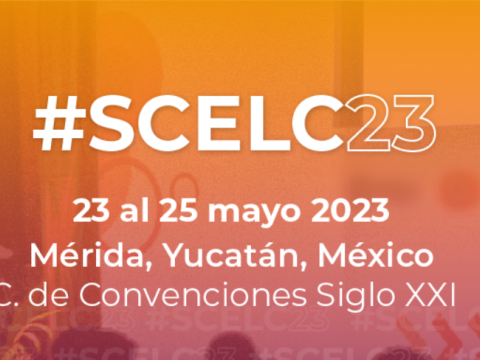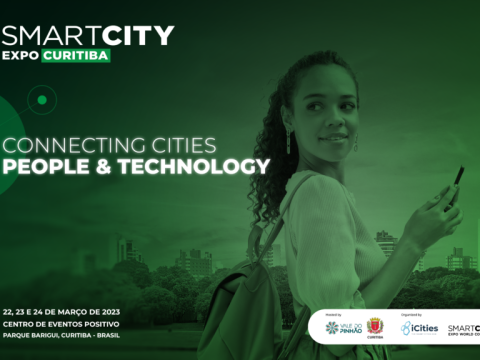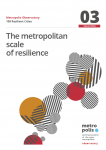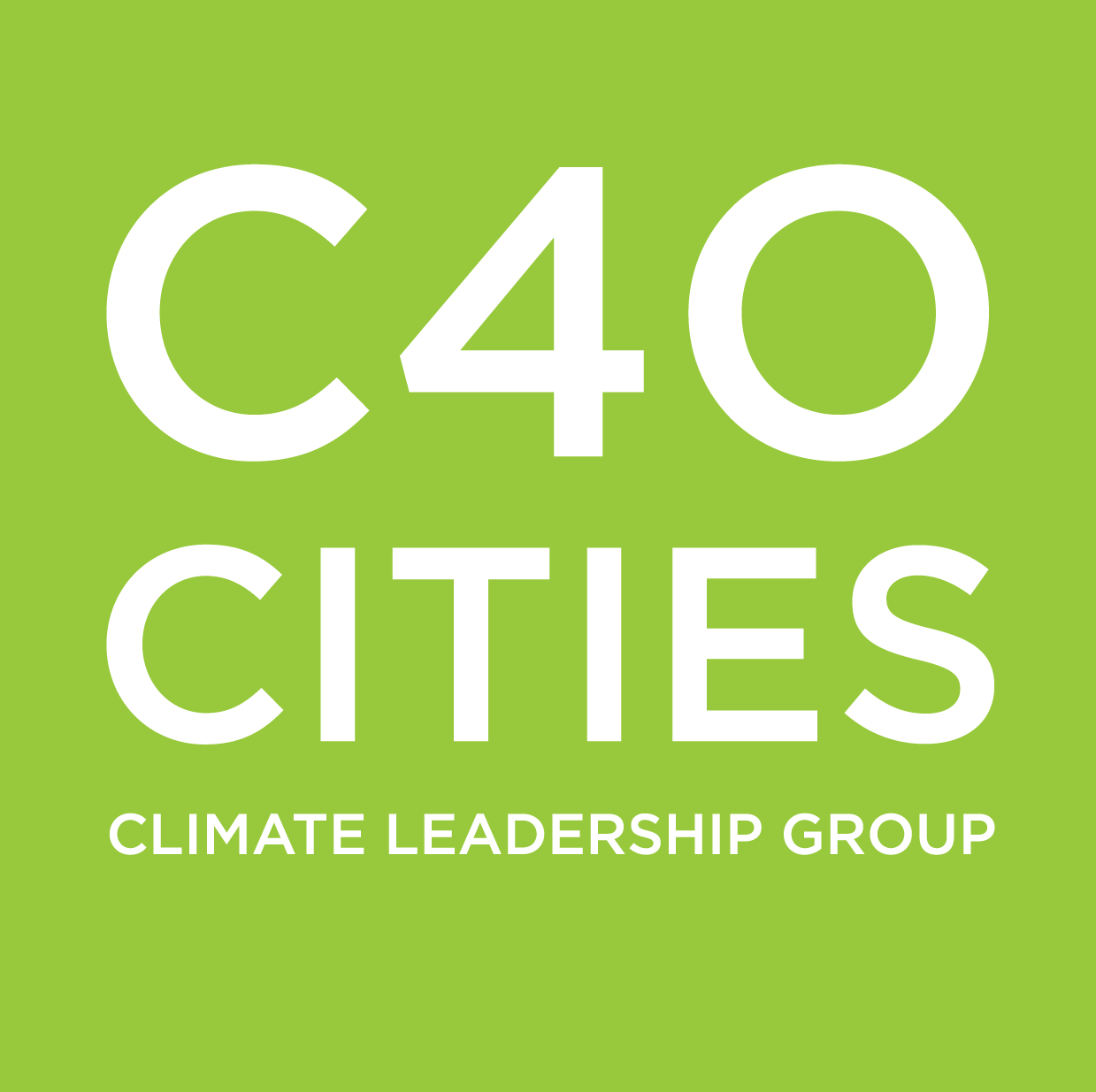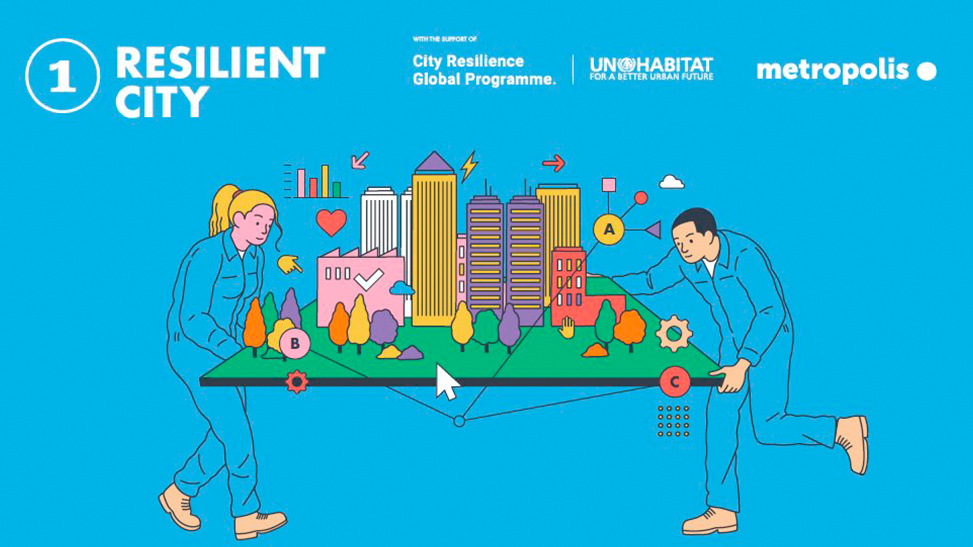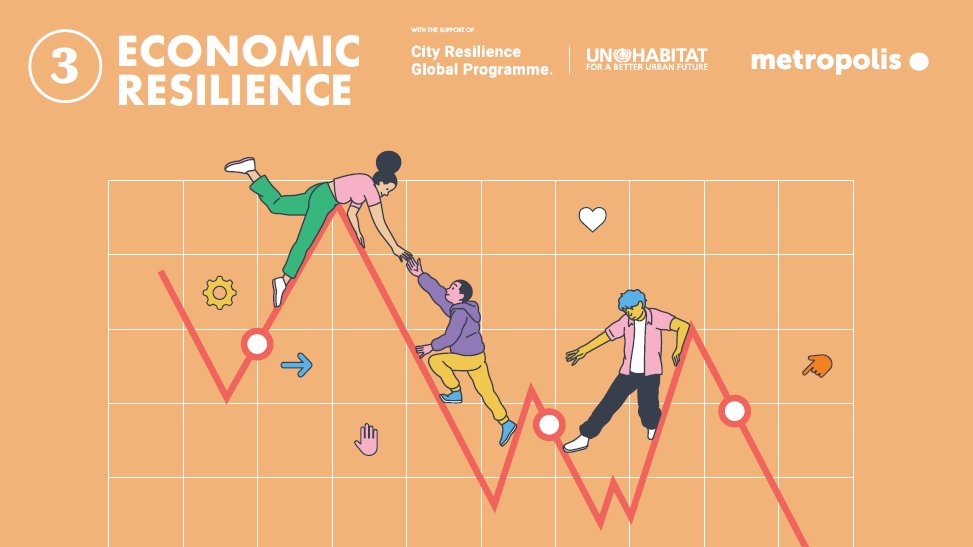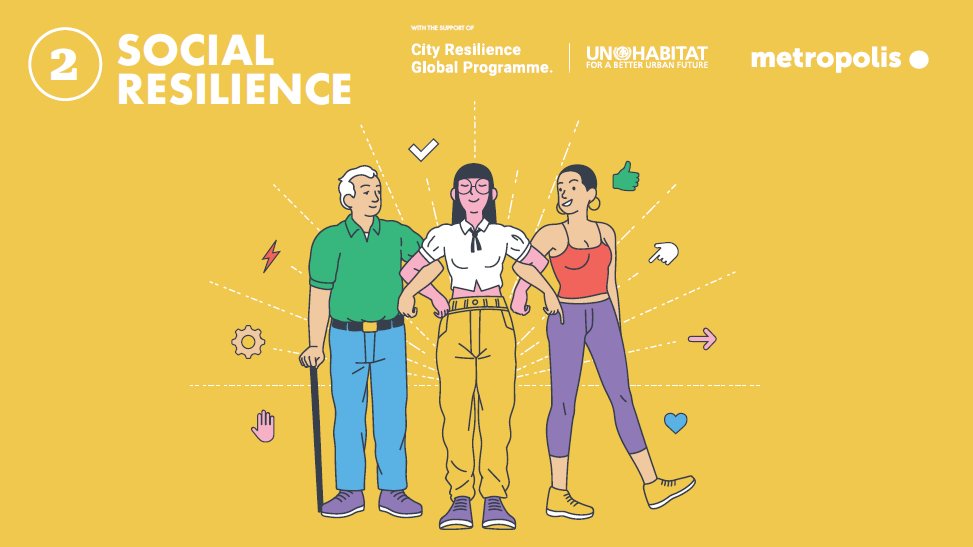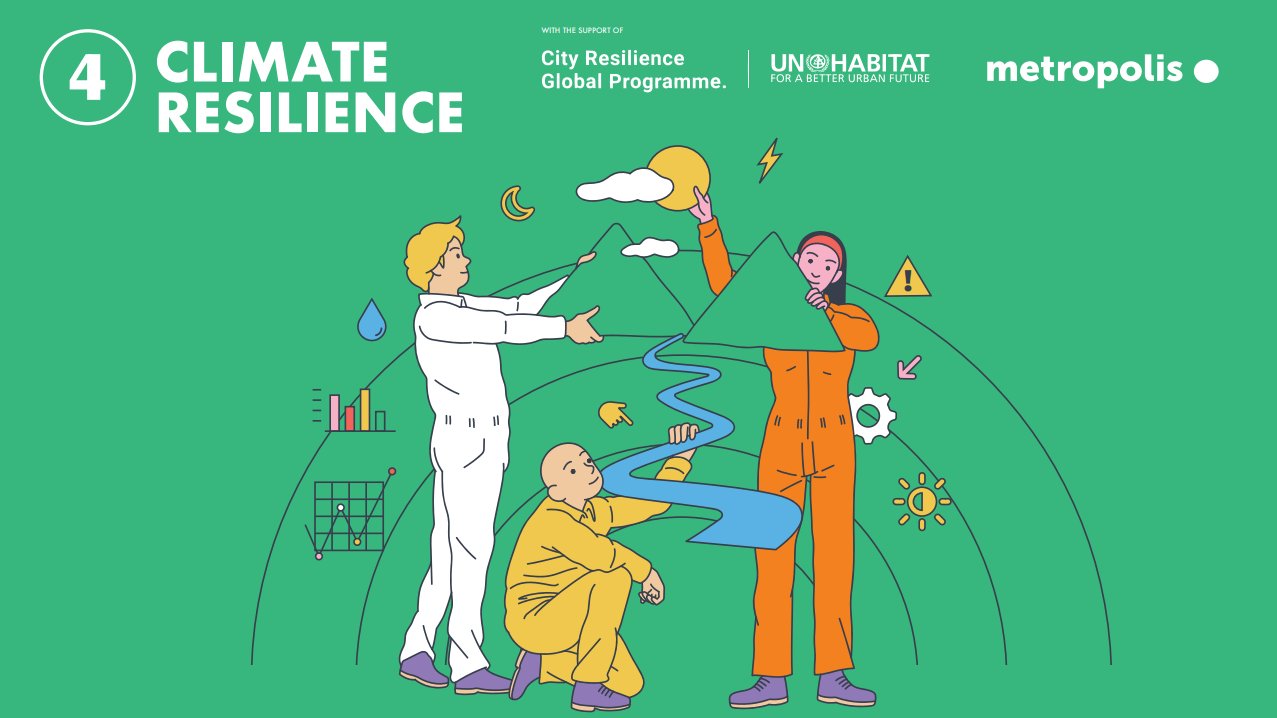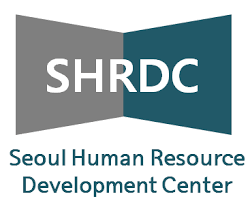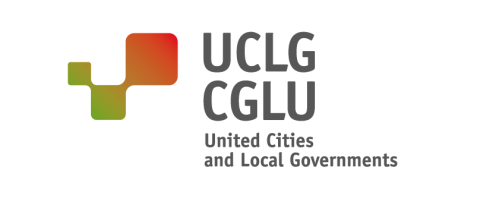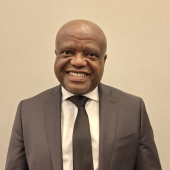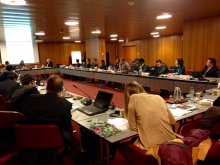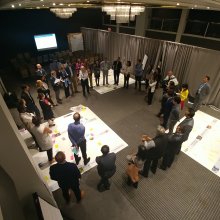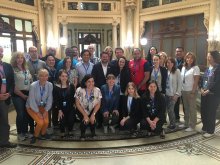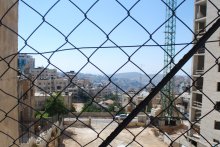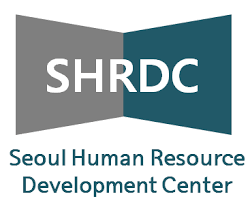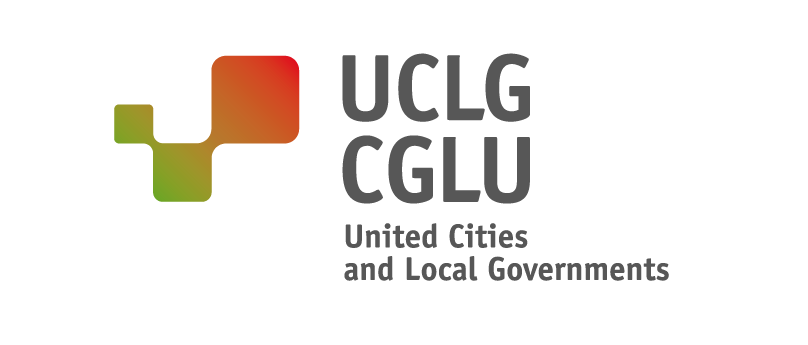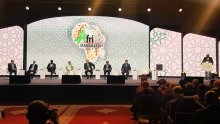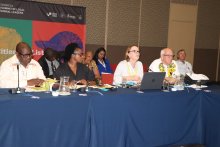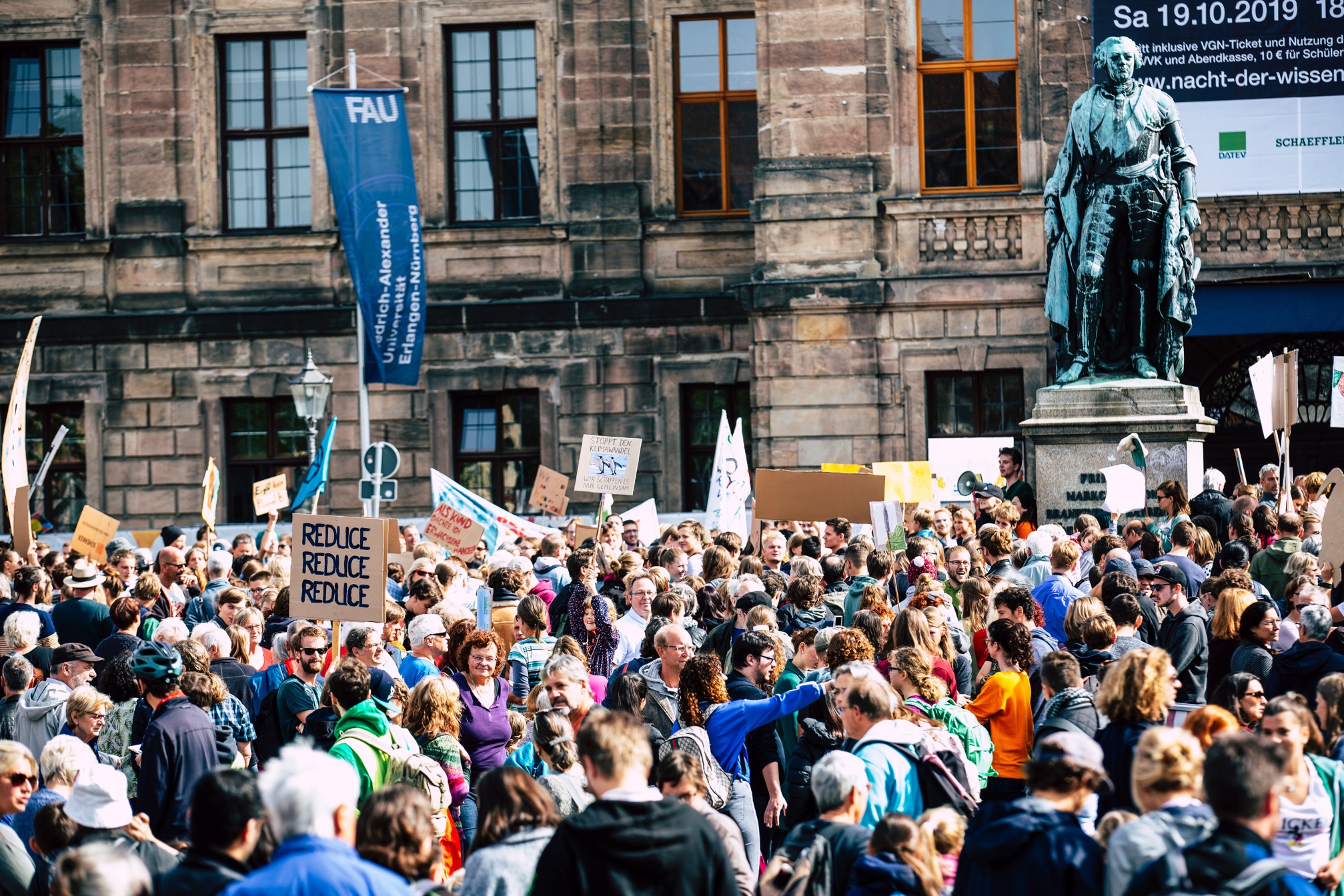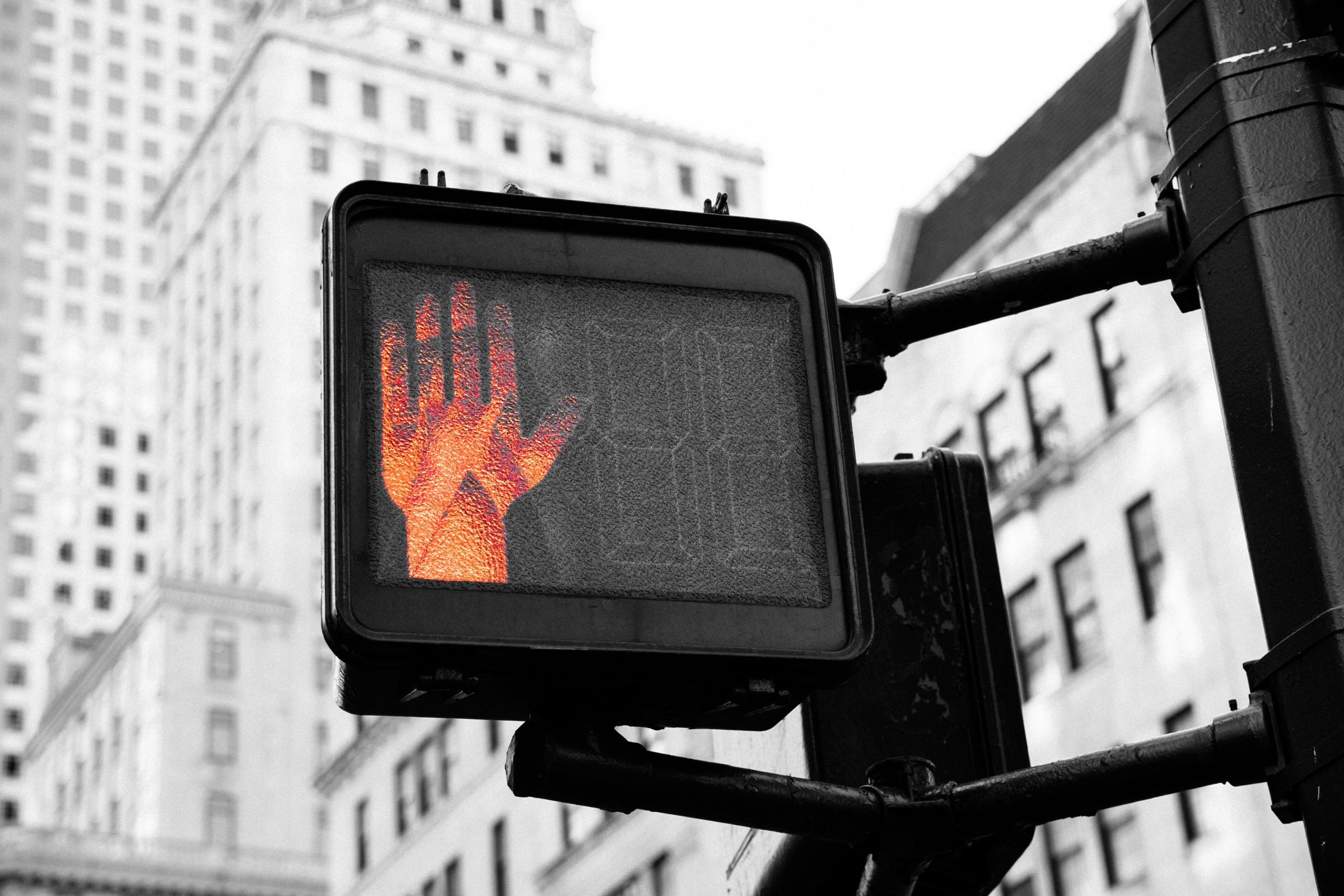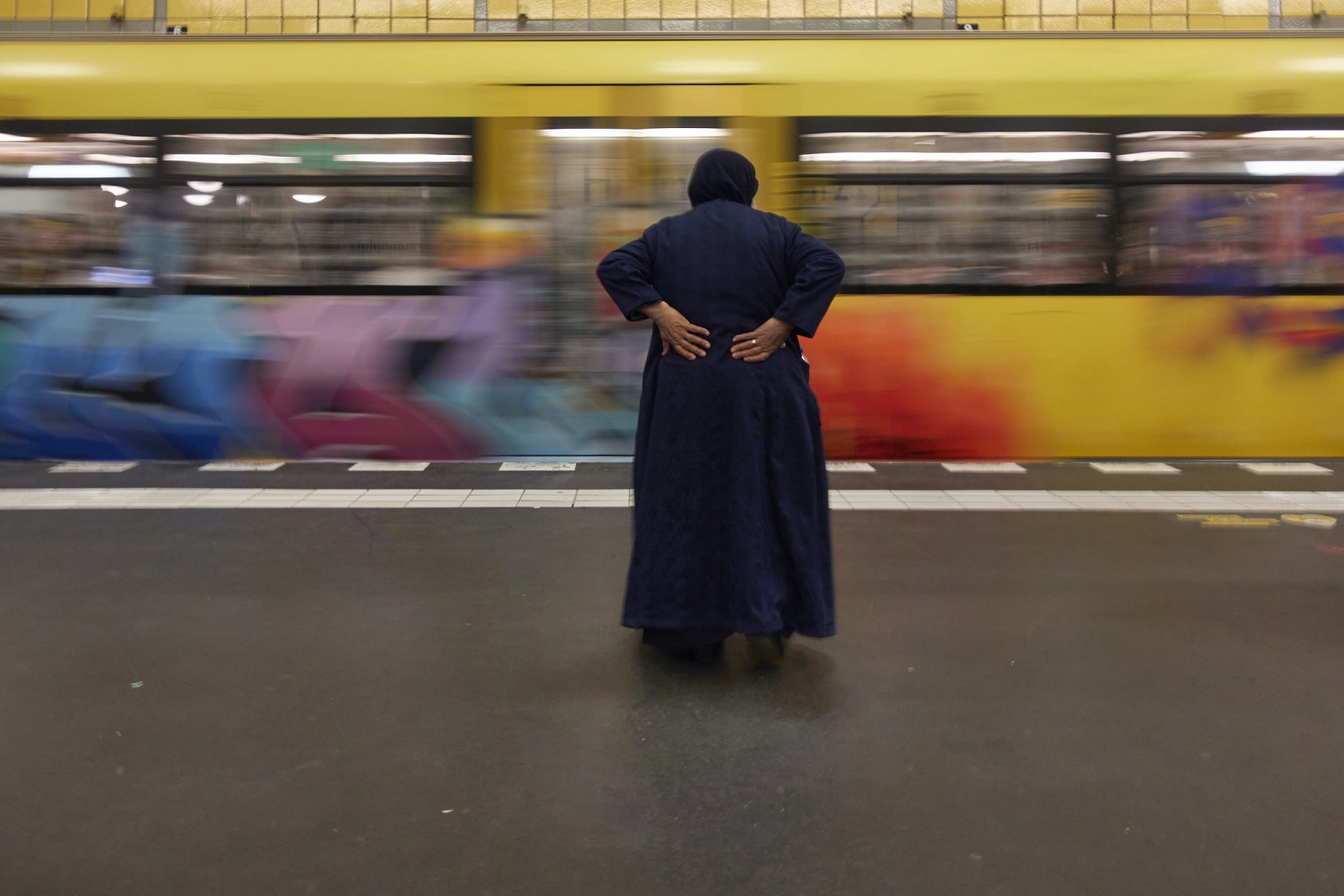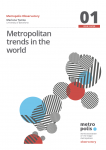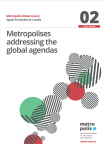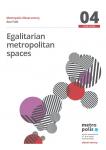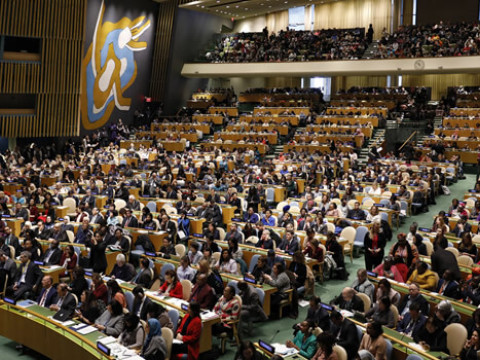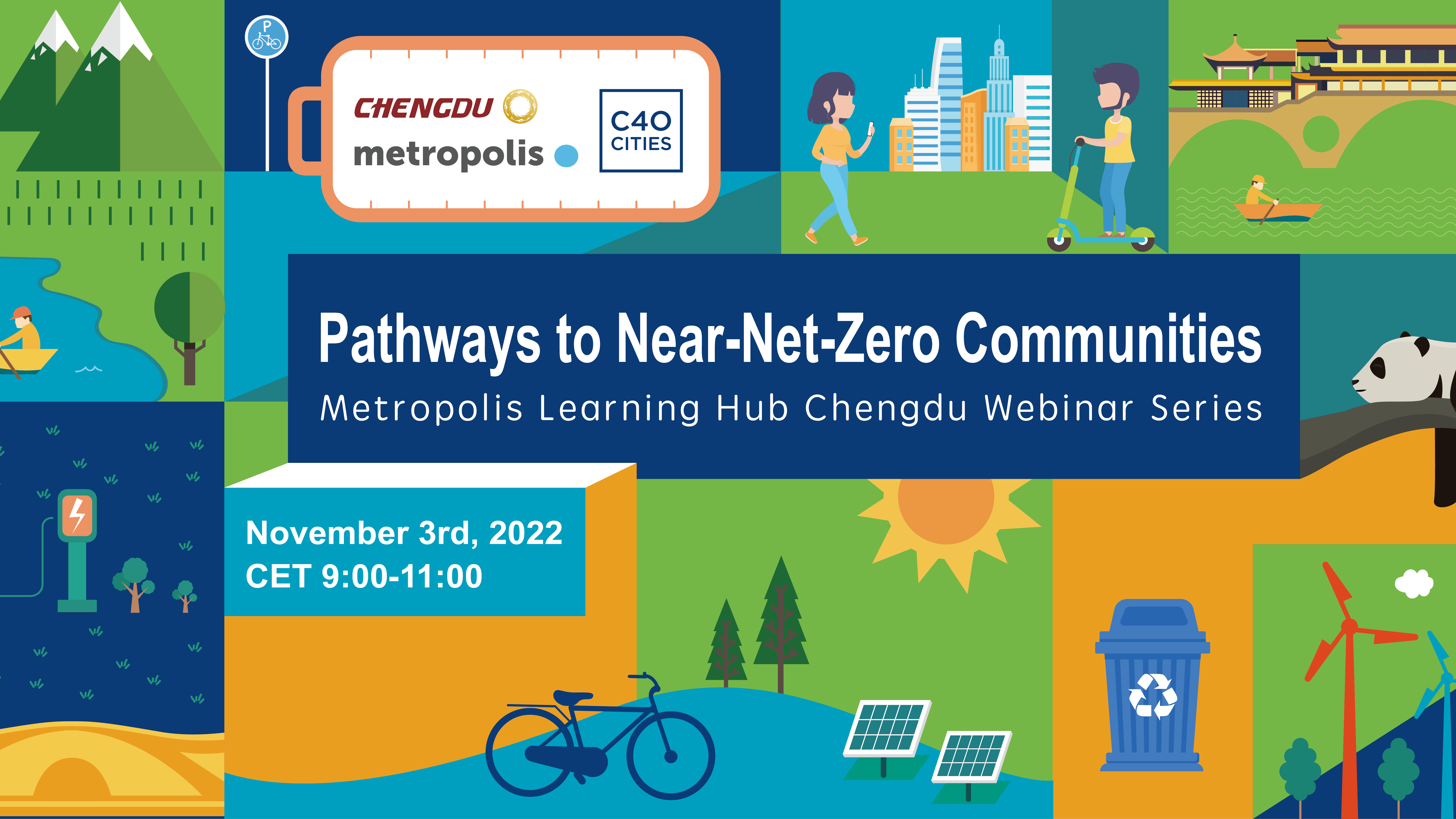
Creating a Net Zero Community
Metropolis Learning Hub Chengdu with the support of C40 and Chengdu’s Municipal Commission for Urban and Rural Community Development and Management organised a session which seeked to provide knowledge on how to design good public policies to help foster favourable climate for green transition and guidelines that help grass-root communities navigate their way to net zero transition. This session had speakers from C40, Chengdu and Madrid.
For more information, you can read the programme of the event.
Working towards the 2030 peaking goal and long-term carbon neutrality China's national goal, local governments have a critical role to play in helping to implement policies on the ground and establishing an enabling environment for stakeholders to increase contributions to net-zero.
To achieve peaking and carbon neutrality goals, and explore a near-net-zero solution that adapts to local conditions, the city of Chengdu released the Work Plan for Pilot Near-Net-Zero Communities in March 2022, targeting to create 10 near-net-zero communities in 2022 and 30 more by the end of 2025.
In July 2022, Chengdu joins hands with C40’s Green and Thriving Neighbourhoods Network. The two parties, together with the Science and Technology and Industrialisation Development Centre of China’s Ministry of Housing and Urban-Rural Development, will work jointly on a pilot net zero community project in Chengdu.
On the eve of the COP27, Metropolis Learning Hub Chengdu with the support of C40 and Chengdu’s Municipal Commission for Urban and Rural Community Development and Management organised a webinar under the tittle " Pathways to Near-Net-Zero Communities", a way to address climate change not only a local and neighbourhood level.
The objective of the session was to provide knowledge on how to design good public policies to help foster favourable climate for green transition and guidelines that help grass-root communities navigate their way to net zero transition. That is exactly what Luke Sherlock from C40 Cities pre-recorded video message was meant to: providing 5 key elements to make urban public space accessible, inclusive, cohesive and green and so to harness for low carbon urban development.
On the other hand, Chengdu representatives presented its initiatives at the neighbourhood scale such as "Chengdu’s Near-net-zero Initiative at Community Scale" and "Chengdu’s low-carbon programme within the framework of Park City Initiative, featuring complete neighbourhoods and the 15-minute city"
On the European side, Madrid presented the Madrid 360 Environmental Sustainability Strategy and how private and public transport modes are being changed to reduce emissions and to return public space to the people.
For more information, you can read the programme and watch the recording of the event.
- Ms. Li Li, Vice Director General, Chengdu Foreign Affairs Office
- Mr. Lei Ke Vice-Director, Commission for Urban-Rural Community Development and Governance of CPC Chengdu Municipal Committee
- Mr. Luke Sherlock, C40 Director of Urban Planning & Design
- Ms. Yao Nan, Deputy chief engineer of Chengdu Planning and Design Institute
- Lola Ortiz Sánchez, General Director of Mobility Planning and Infrastructures, Madrid City Council
- Mr. Jordi Vaquer, Secretary General of Metropolis
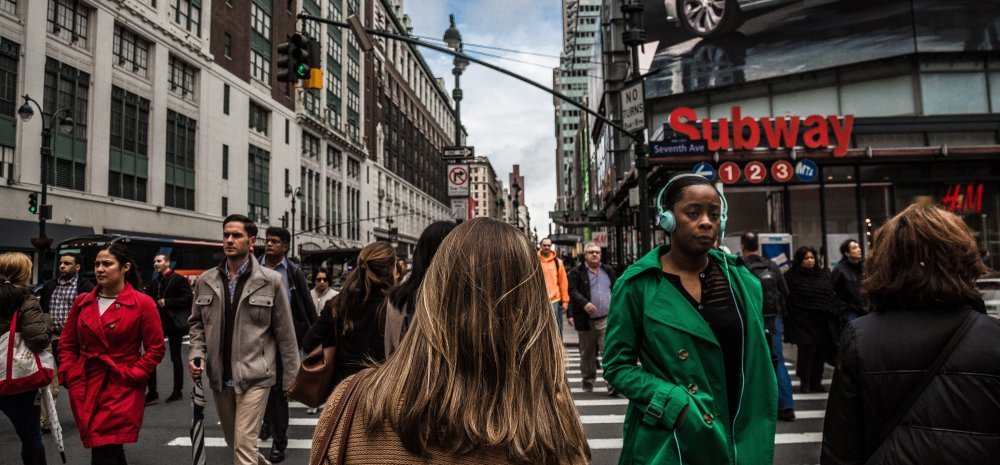
On-line training program on Resilient City (2nd edition)
In collaboration with UCLG, UCLG-ASPAC, and the SHRDC as MITI HQ, we organised a Learning Program on "Resilient City", which provided various e-learning contents and diverse policy cases with active discussions among the participants.
More than half of the world’s population resides in urban and metropolitan areas, and cities have experienced rapid growth and urbanization. The local governments have to endure the threats and vulnerabilities as a result. Thus, strategic disaster risk reduction and response measures are critical for the sustainability. However, resilience is about more than natural disasters. It should incorporate a holistic perspective that covers social, economic, and climate dimensions, as well.
The Sendai Framework, adopted at the Third UN World Conference in Disaster Risk Reduction, recognizes the need for improved understanding of disaster risk, the strengthening of disaster risk governance, and the mobilization of risk sensitive investment to reduce natural and social risks and to support the vulnerable.
You can consult the guidebook of the programme here
During the second live session of this training program, we explored the concept "Resilient City" as well as the three dimensions of resilience: climate, economic and social.
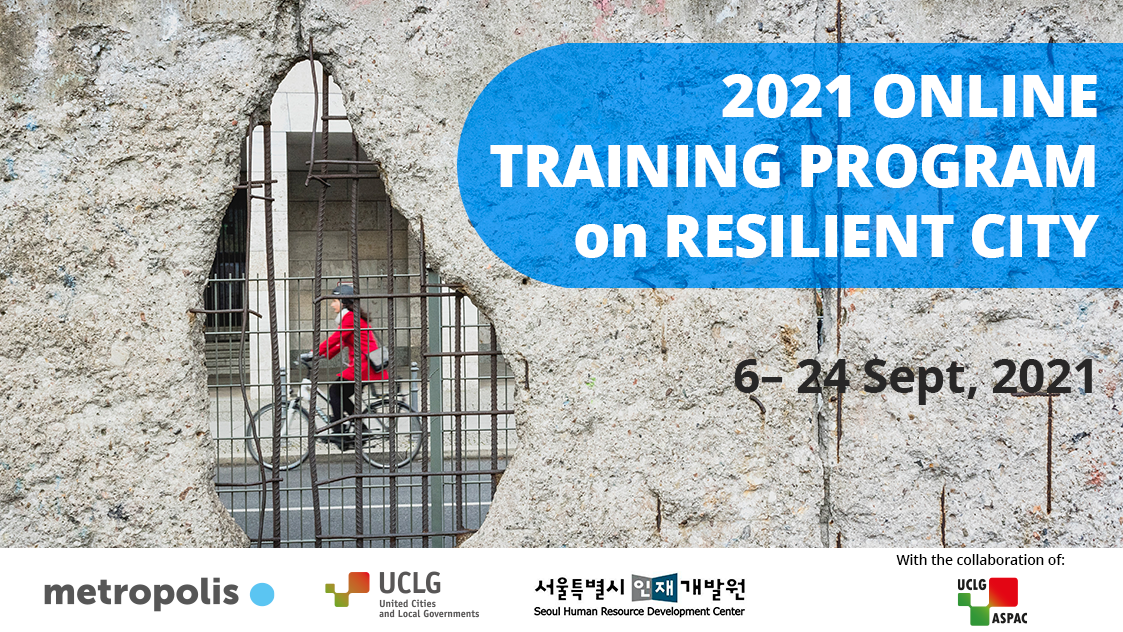
On-line training program on Resilient City (1st edition)
To highlight the challenges and threats that cities must face in order to remain economically, socially and disaster resilient, Metropolis jointly with SHRDC, UCLG and with the collaboration of ASPAC organized a three weeks on-line training program called “Resilient City.
Metropolis organized the second session of this course, which was based on the experiences of Tehran, Istanbul, and Berlin, who gave testimonies and share their experiences providing tools to contribute to the creation of policies for a more resilient metropolitan space.
If you want to find more about this learning program, you can read the Guidebook and the news.
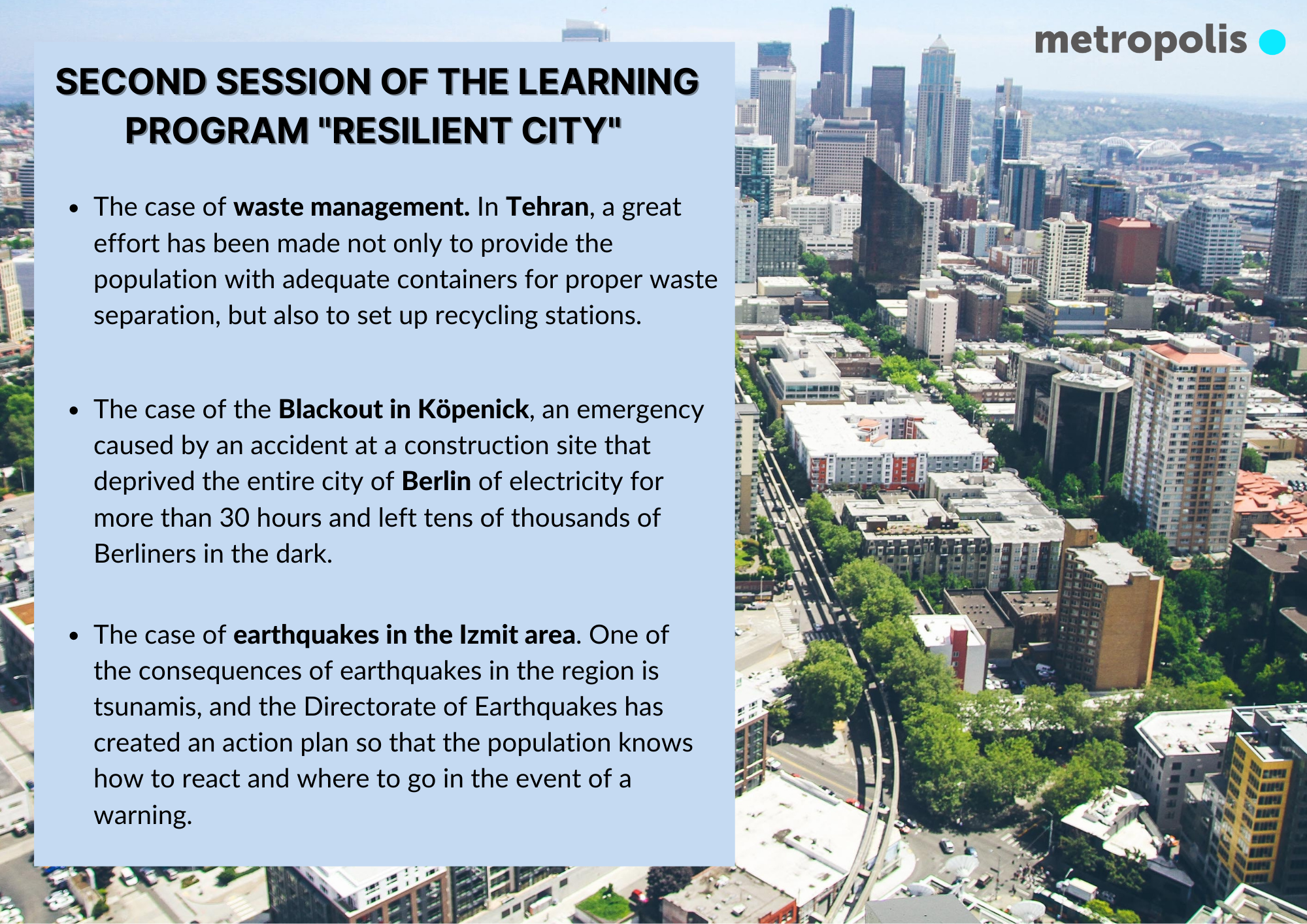
- Constantin Ahrens, liaison officer to the Berlin fire brigade, Senate Department for the Interior and Sport
- Dr. Sadredin Alipour, CEO of Waste Management Organization: the KAP project, Tehran
- Mr. Evrim Yavuz, Senior geophysicist, IMM’s Directorate of Earthquake and Geotechnical Investigation, Istanbul Metropolitan Municipality
- Ms. Melis Bayraklı, Senior geophysicist, IMM’s Directorate of Earthquake and Geotechnical Investigation, Istanbul Metropolitan Municipality
- Juan Carlos Uribe, UCLG
- Bernardia Irawati Tjandradewi, UCLG ASPAC Secretary General
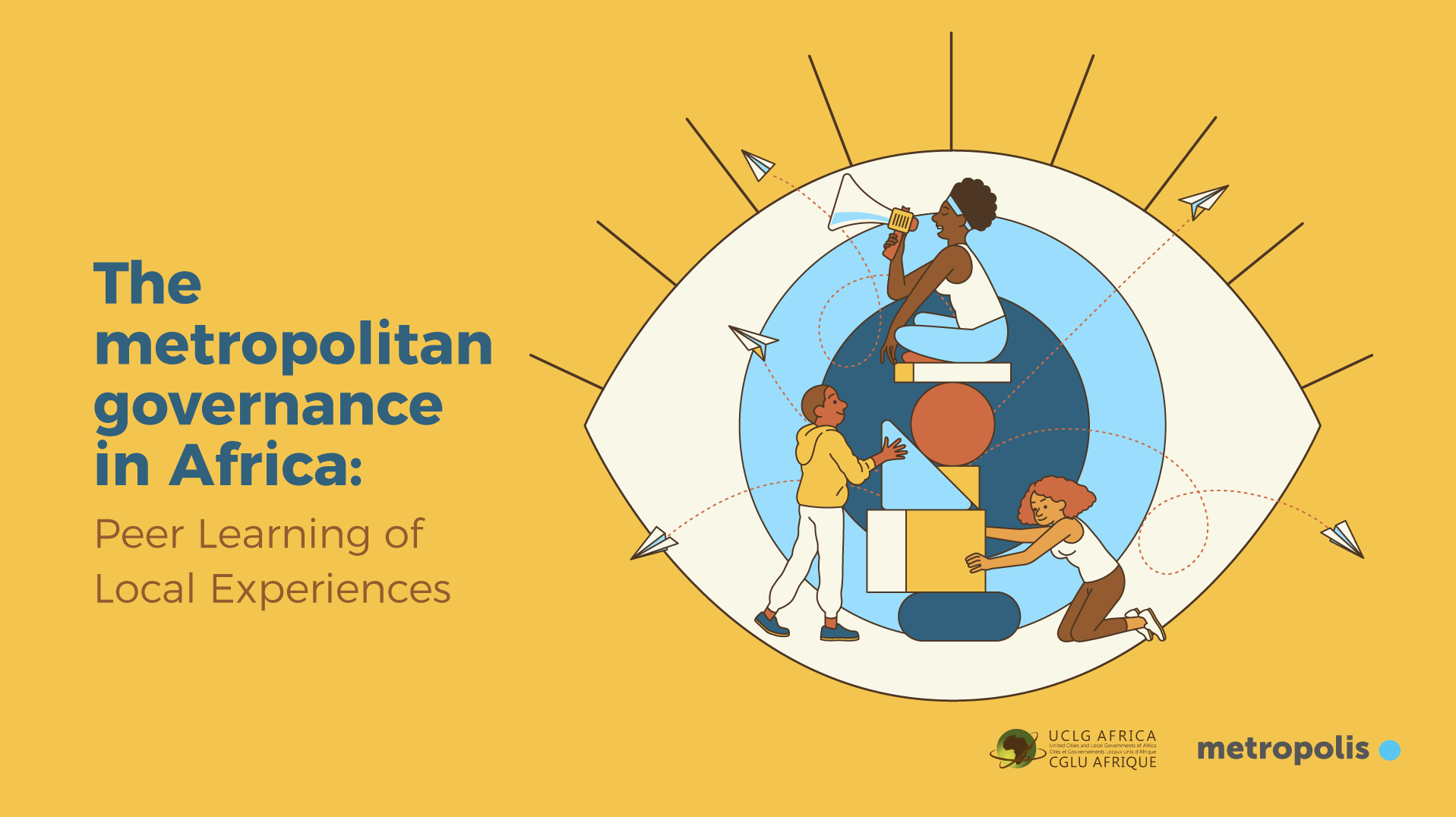
The metropolitan governance in Africa
Based on a pedagogical content designed by Metropolis, this learning program aims to introduce the metropolitan reality and how metropolitan governance with a gender perspective can be the key to face the challenges and threats that surround our metropolises. In addition, the course seeks to present governance models, as well as to emphasise on the importance of the Right to the city in a metropolitan context.
Nowadays, the metropolitan phenomenon is a reality of urban dynamics in large cities and metropolises. Metropolisation as a process of growth of urban areas into a larger functional urban unit is underway in several urban areas in Africa (Metropolis, 2019). This makes these areas not only places where economic issues are at stake (production of national growth) but also places where social and environmental issues are crucial (accessibility to urban services, housing, social cohesion, flooding). It is therefore on the scale of metropolitan areas that are “more diluted and more compact, more integral and discontinuous” (Ascher, 1995) that the urban phenomenon must be understood.
The cities and metropolises are called upon to provide responses at the right functional scale to address the challenges of socio-spatial inequalities, sustainability, resilience and urban innovation. These challenges are at the heart of the 2030 Agenda to “Build resilient infrastructure and foster innovation” (SDG9), “Make cities and human settlements inclusive, safe, resilient and sustainable” (SDG11) and “Adopt innovative digital solutions” (SDG 17).
- Session 1. Models of Metropolitan Governance
-
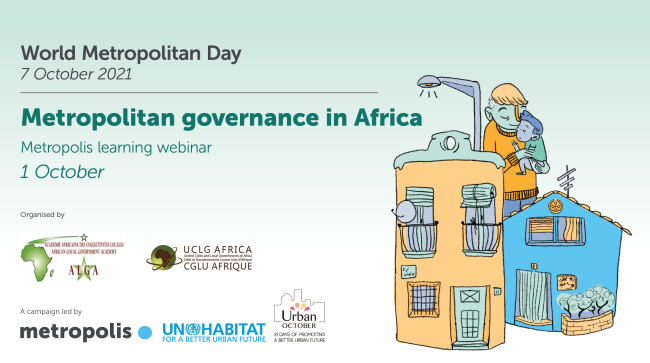
In this first webinar, based on the pedagogical content of the publication Models of Metropolitan Governance, we analysed the different metropolitan governments models (metropolitan governments, sectoral metropolitan agencies, vertical coordination, voluntary cooperation) while looking at the situation of Africa.
We also explored the elements that characterise metropolitan governance models: financing, competences, democratic representation, multilevel relations and the main challenges and strategies to promote a form of metropolitan governance with a gender perspective.
The program of the session, protagonized by the experts from City Insight, was divided in two parts. First of all, they related the theoretical framework with the African context and, after that, they analysed the implementation of a gender approach.
If you want to know more about the session, you can read the news
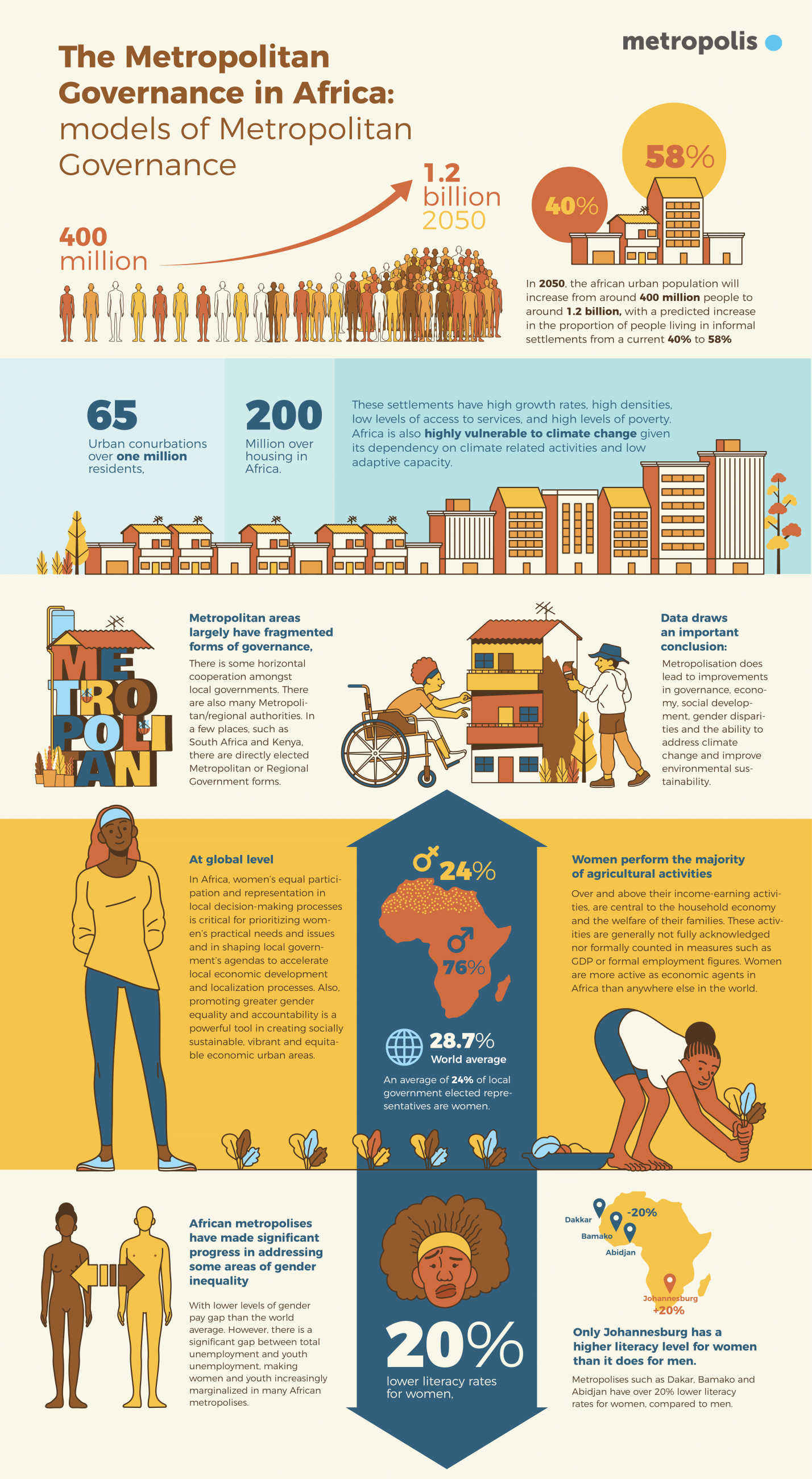
- Session 2. Right to the Metropolitan City in the Framework of the New Urban Agenda and the 2030 Agenda
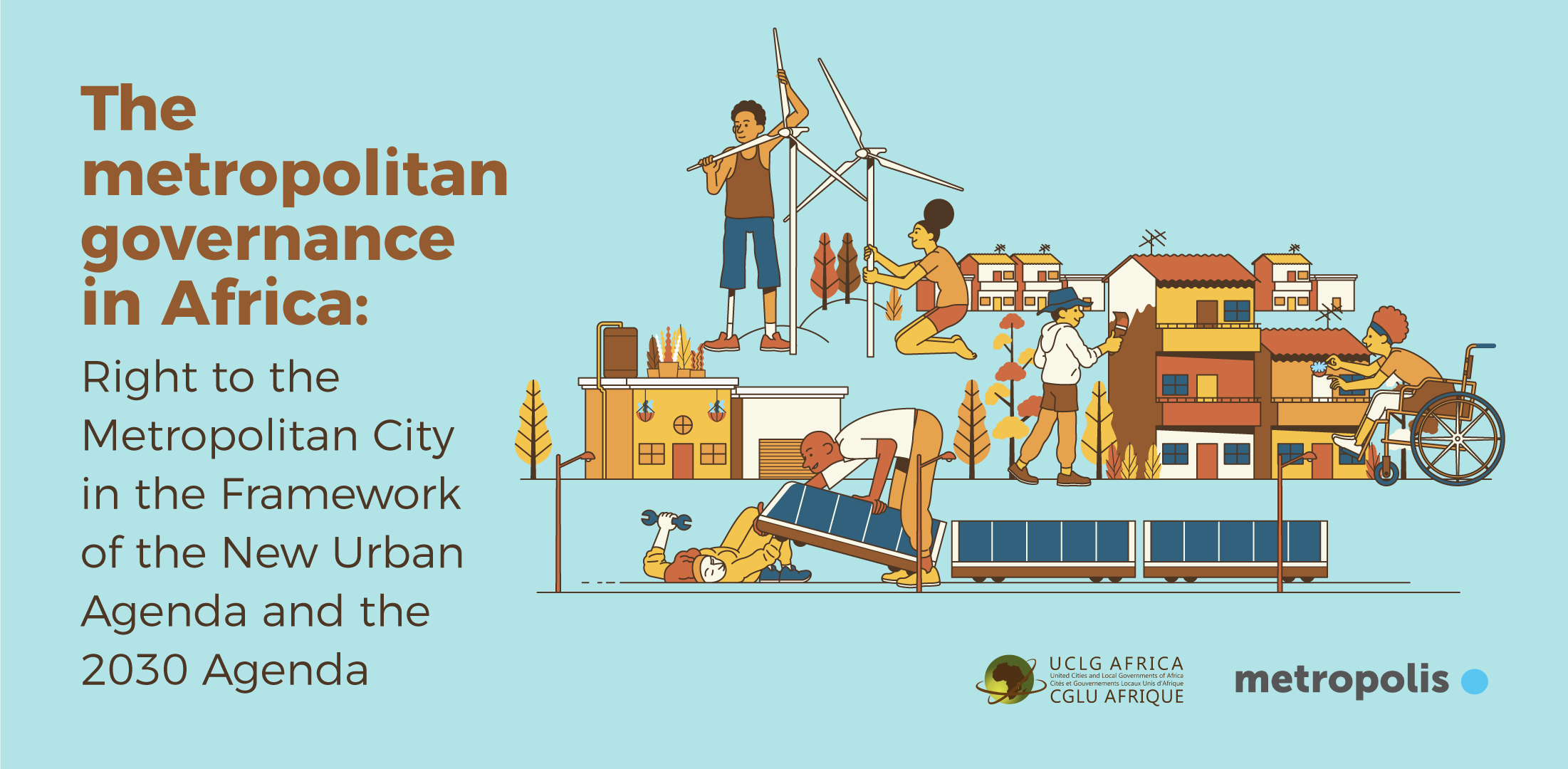
In the second webinar of this course, based on the pedagogical content of the publication Right to metropolitan city in the framework of the NUA and the 2030 Agenda, we addressed the importance of reconsidering the Right to the City in a metropolitan context that reflects the current reality of urban dynamics. The concept of the Right to the city is not new but remains fully current. It references the right to “create” a city as a concern of urban life. It thus focuses on the capability of the people who live in the city to transform it and for society to be transformed through it.
We also analysed four different manifestations of the right to the city in the African context: the right to housing; the right to public space; the right to urban security from a feminist perspective; and the right to metropolitan mobility.
For more information, you can visit the program and read the news
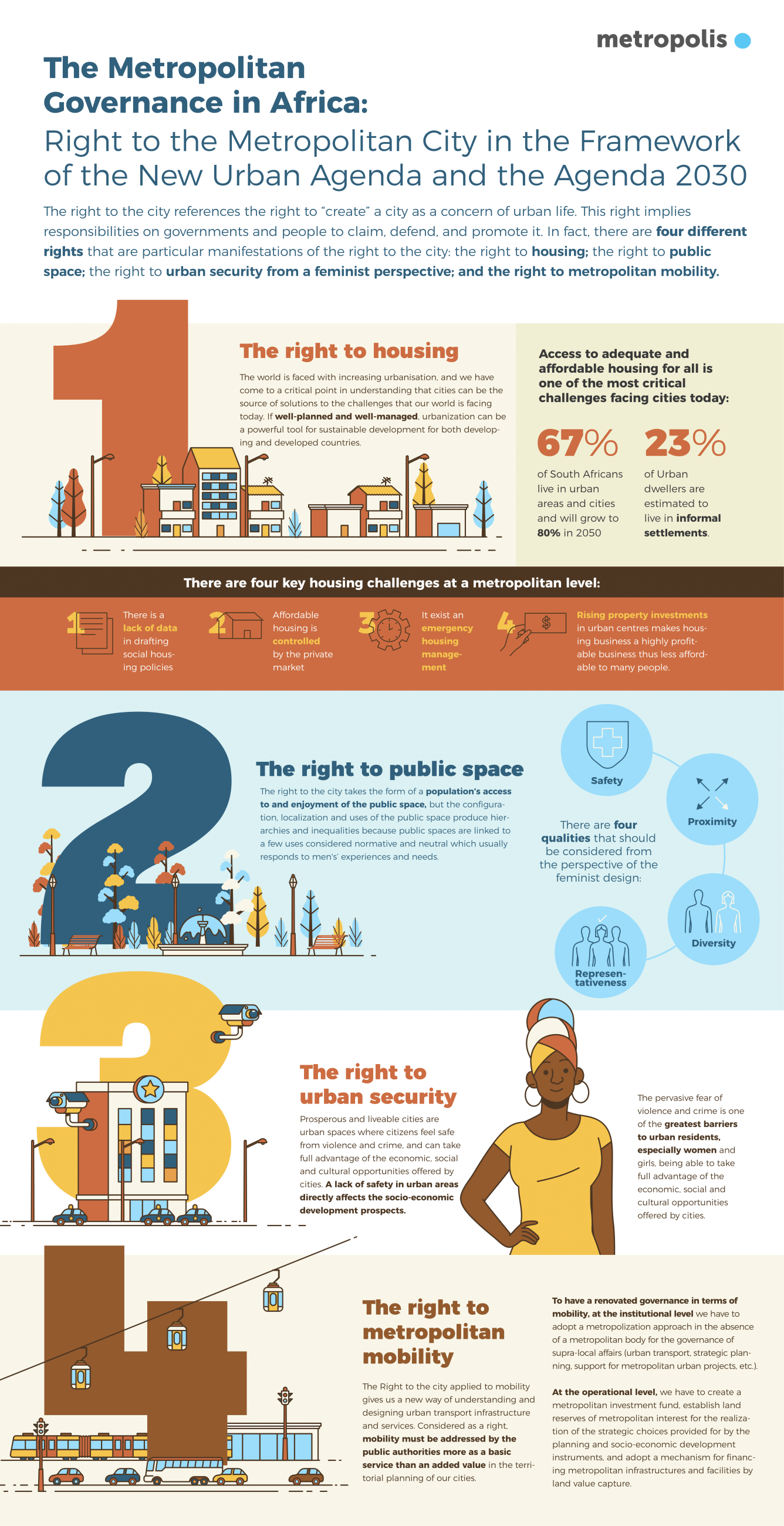
- Session 3. Case studies
-
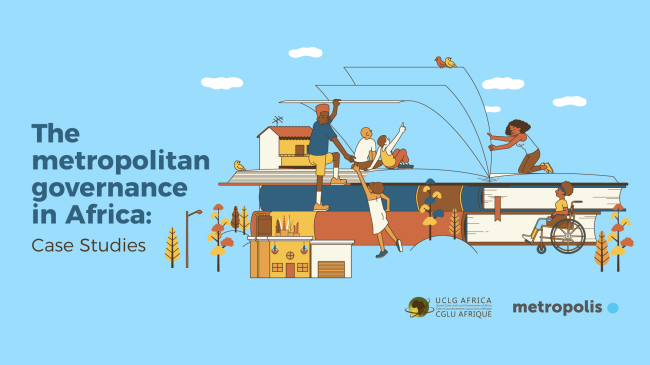
This webinar was an opportunity, first, to understand the issues of sustainability, resilience and urban intelligence, second, to elucidate how they are embodied at the metropolitan scale, and third, to focus on the challenges and obstacles that African cities and metropolises face in deploying resilience strategies and innovative digital solutions.
Participants were able to learn more about different experiences from Morocco (in particular from Fez) and South Africa.
For more information about the third session, you can read the concept note
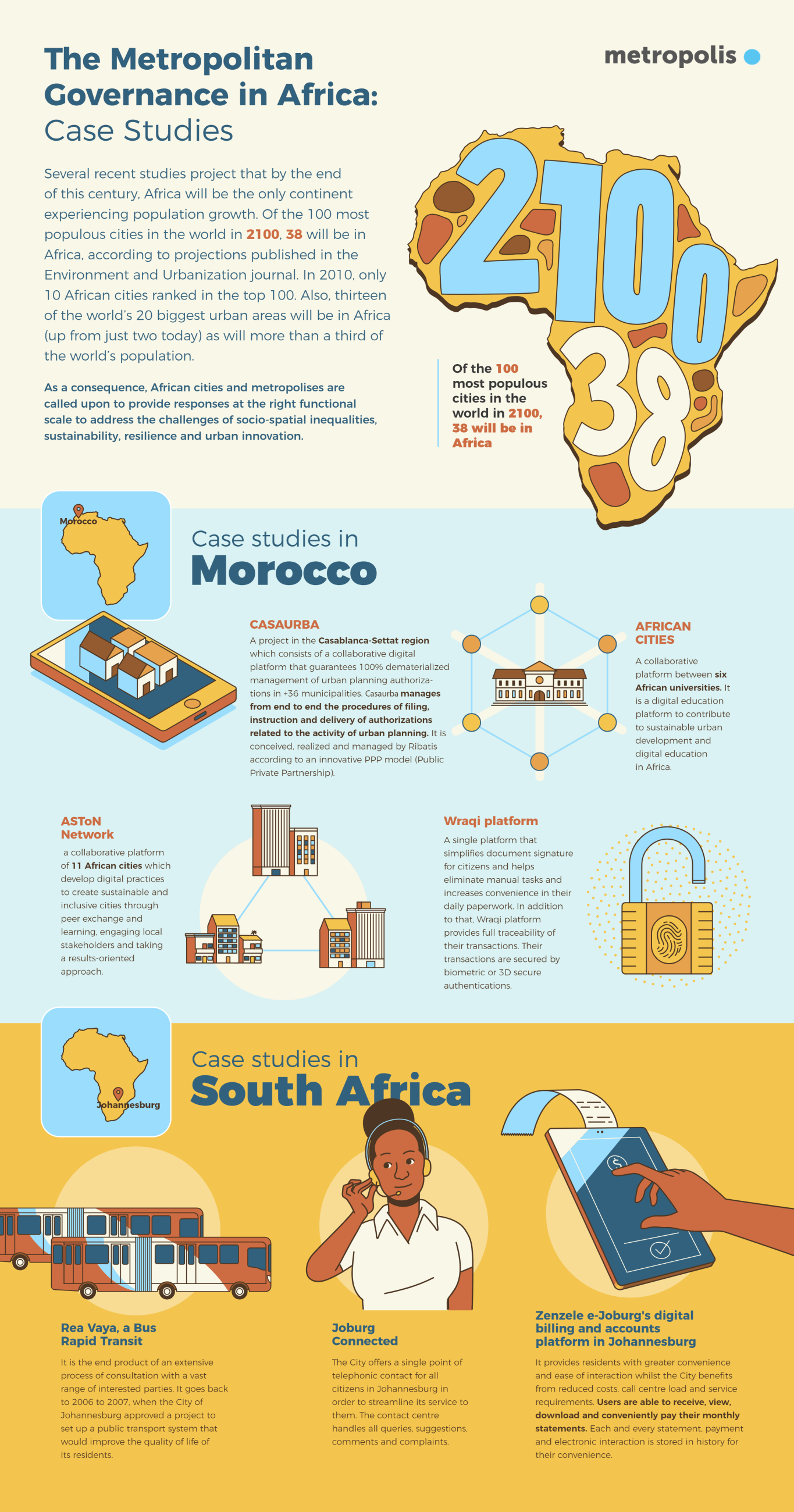
- Session 4. Peer Learning From Local Experiences
-
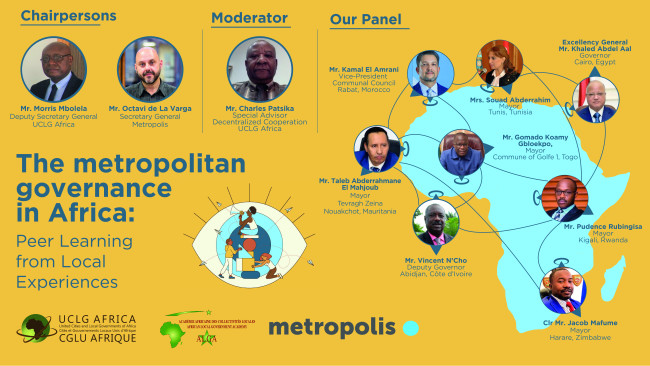
During the 4th session of this course: “Peer Learning From Local Experiences” city managers from Rabat, Tunis, Cairo, Nouakchott, Abdijan, Harare and Kigali participated in a peer review of their local experiences facing the challenges produced by the rapid urban growth and the COVID-19 pandemic, giving a particular mention to the role of digitalisation.
For more information, you can read the concept note in english and french or consult the program of the session in english and french.

- Michael Sutcliffe, co-director of City Insight, an agency that provides insight, information and advice on local level development
- Sue Bannister, co-director of City Insight, an agency that provides insight, information and advice on local level development
- Jean-Pierre Elong MBassi, UCLG Africa Secretary General.
- Octavi de la Varga, Metropolis Secretary general.
- Nomkita Fani, Director Intermediate Cities and Spatial Planning at Department of Cooperative Governance and Traditional Affairs
- Mpilo Ngubane, Executive Director of Cifal Durban, Chief Learning Officer of the eThekwini Municipal Academy and Adjunct Professor of Research at UNISA’s School of Business Leadership (SBL).
- Genevieve Hartley, Program Manager, MILE
- Dr Mostafa Kheireddine, Urban planner of the University of Montreal, Researcher in city sciences, Rabat
- Kate Joseph, Deputy director from the Group Strategy Policy Coordination and Relations from Johannesburg
- Ane Miren Ibañez Zugazaga, Director of BilbaoTIK, a technology company of the Bilbao City Council
- El Khettab Mohamed, Communal Council of Fès, Morroco.
- Moinul Zaber, United Nations University e-GOV
- Matteo Gattola, Founder of Environ: "Mobility and Lighting", Italy.
- Morris Mbolela, UCLG Africa Deputy Secretary General
- Charles Patsika, Special Advisor for Decentralised Cooperation at UCLG Africa
- Khaled Abdel Aal, Governor of Cairo, Arab Republic of Egypt
- Kamal El Amrani, Rabat Vice-President of the Communal Council of Rabat, Morocco
- Souad Abderahim, Mayor of Tunis, Tunisia.
- Vicent N’Cho, Deputy Governor of Abidjan, Ivory Coast.
- Jacob Mafume, Mayor of Harare, Zimbabwe.
- Taleb Abderrahmane El Mahjoub, Mayor of Tevragh Zeina, Mauritania.
- Gomado Koamy Gbloekpo, Mayor of the Commune of Golfe,Togo.
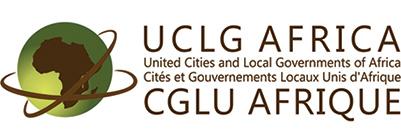

Rethinking metropolitan governance
Metropolitan governance is a process of coordination of stakeholders, social groups and institutions with the intention of delivering on debated objectives that have been discussed collectively and defined in fragmented environments. It involves a concept that spread as of the 1990s which is distinguished from the classic notion of “governance” by taking a broader view that covers not only the role of the public sector but also the private one in metropolitan governability.
La gobernanza metropolitana es un proceso de coordinación de actores, de grupos sociales y de instituciones con la intención de alcanzar unos objetivos debatidos que se han discutido colectivamente y se han definido en entornos fragmentados. Se trata de un concepto extendido a partir de los años 1990 que se distingue de la noción clásica de “gobierno” por una visión más amplia que incluye el papel del sector público, pero también privado en la gobernabilidad metropolitana.
- Models of metropolitan governance
- The right to the city at the metropolitan scale
- Metropolitan public space from a gender perspective
- The right to housing in metropolises
- Tackling urban security
- The right to metropolitan mobility
- Modelos de gobernanza metropolitana
- El derecho a la ciudad a escala metropolitana
- El espacio público metropolitano desde una perspectiva de género
- El derecho a la vivienda en las metrópolis
- Abordar la seguridad urbana
- El derecho a la movilidad metropolitana
Module 1
Models of metropolitan governance
Metropolitan governance is “a process of coordination of stakeholders, social groups and institutions with the intention of delivering on debated objectives that have been discussed collectively and defined in fragmented environments” (Borraz and Le Galès, 2001: 350). It involves a concept that spread as of the 1990s which is distinguished from the classic notion of “governance” by taking a broader view that covers not only the role of the public sector but also the private one in metropolitan governability (Jouve and Lefèvre, 1999).
You can read the module here
- What are the models of metropolitan governance?
-
Four main models of metropolitan governance can be differentiated, depending on their degree of institutionalisation:
- Metropolitan governments: Structures expressly created to implement metropolitan-scale policies with a view of the whole. They can take the form of a “metropolitan city” from the merger of municipalities or uphold the municipal structure and generate a second level of government with indirect election.
- Sector-based metropolitan agencies: Organisations that are more technical than political and which plan and manage a single service (public transit, environment, etc.). They usually have a model of indirect representation with funding deriving from fees and transfers.
- Vertical coordination: This is a model where there is no initial recognition of the metropolitan reality and policies are implemented through previously existing areas of government. Remits, funding and representation depend on the territorial structure of the country.
- Voluntary cooperation among municipalities: This is a model where local representatives are organised at their own initiative. It can take the form of an association of municipalities with a legal framework according to the political will of its members, or a strategic planning association to generate consensus spaces among the parties.
- Variables for analysing metropolitan governance
-

Governance model remits differ according to the size and type of issues concerning the physical world (hard policies) or the socioeconomic world (soft policies); whether or not decision-making is exclusive, and the degree of coverage of these decisions in line with whether they are binding or not.
Funding goes a long way to determining the measure of autonomy of metropolitan structures in relation to the amount of material resources and funding source, which is generally combined between transfers from cities and fees on services.
Representation and citizen engagement in metropolitan governments is generally via models of indirect election, where city halls and government departments form part of the metropolitan structure as representatives of the city where they were chosen.
Multilevel relations give an account of how metropolitan areas are situated in a multilevel governance setting in relation to the articulation between public and private stakeholders (horizontal relations) or between different levels of government (vertical relations).
- How can we onboard the gender perspective in metropolitan governance?
-
Gender-sensitive governance must deliver on 4 challenges:
- Tackle entrenched gender inequalities
- Feminise decision-making
- Incorporate a plurality of views in governance processes
- Commit to a political agenda that recognises the role of women in governance institutions and processes. (Put the discrimination faced by women in governance institutions and processes on the political agenda)
- How can we achieve more balanced governance?
-
Put citizens’ rights at the heart of political action, with more solid and transparent accountability systems.
- Organise more inclusive and participatory processes of engagement which identify the different needs of women and men.
- Raise awareness among governance institutions and stakeholders around gender issues.
- Promote a new distribution of work time for a good work/life balance which encourages forms of distribution and joint responsibility for care between the genders, in addition to giving access to free care facilities.
Module 2
Right to metropolitan city in the framework of the NUA and the 2030 Agenda
The preamble to the World Charter for the Right to the City (2004) coordinated by Habitat International Coalition (HIC) references the right to the city through a series of points that make it possible to analyse it as a complex right, interdependent on other human rights, into which it is integrated in a new way of strengthening its vindication. From its reading we can conclude that it is a human and therefore universal right. Its status of a collective right stems from the city understood as a common good and gives legitimacy to the action and organisation of the more underprivileged and infringed sectors that live there.
You can read the module here
- Why talk about the right to the city on a metropolitan scale?
-
Four main models of metropolitan governance can be differentiated, depending on their degree of institutionalisation:
- To broaden the focus on the improvement of people’s quality of life, traditionally centred on housing and neighbourhoods, towards the metropolitan reality of the city that covers the peripheral, periurban and rural environment.
- As a mechanism to protect the population owing to the acceleration of urbanisation processes.
- To generate bottom-up structures of metropolitan governance, with a critical and community perspective, capable of powering the improvement in quality of life from needs themselves and the expansion of real citizenship.
- To leverage a new way of promotion, respect, defence and realisation of civil, political, economic, social, cultural and environmental rights, guaranteed in regional and international human rights instruments.
- To assume the interdependency of the metropolitan city and foster solidarity among the diverse contexts and experiences that exist within a common metropolitan reality.
- 2030 Agenda: the urgency of sustainable development
-
If we look at the 17 Sustainable Development Goals (SDGs) we can see the crosscutting character and importance they all have for metropolitan public policies. However, SDG 5 and SDG 11 have a strategic importance regarding the right to the city and the construction of the metropolitan agenda.
SDG 5. Achieve gender equality and empower all women and girls[1]
SDG 11. Make cities and human settlements, safe, resilient and sustainable
More information: https://www.un.org/sustainabledevelopment/es/gender-equality/
- The New Urban Agenda: metropolitan scale and right to the city
-
The New Urban Agenda (NUA) corresponds with the 2030 Agenda with regards the metropolitan approach committed to the right to the city. In their conception, metropolitan areas are key to promoting viable communities at different scales. The document indicates action lines in relation to the eleventh sustainable development goal of the 2030 Agenda: “Making cities and human settlements inclusive, safe, resilient and sustainable”
- Encourage and use metropolitan planning to support viable groups
- Work from integral and inclusive approaches
- Support metropolitan policies on sustainable development
- Provide effective responses to growth.
- Foster sustainable mobility
- Promote the improvement of marginal neighbourhoods and urban revitalisation
- Deploy measures that ensure respect for the rights of existing populations
- Introduce the multilevel approach to metropolitan policies (local, metropolitan, regional and state governments).
Module 3
Metropolitan Economic and Sustainable Development Practices and Policies: A Critical Look
Smart city and urban resilience strategies are approached at a metropolitan scale to step up to the battle against social inequality and climate change.
You can read the module here
- Main criticisms around the Smart City concept
-
- Technological determinism that can overestimate the transformative power of technology, while the nontech sides of urban problems are ignored.
- The geographic and detextualised vision that can double down on splintering or inequalities by shoring up existing power relations
- Depoliticising, disciplining and delimiting the notion of citizenship. A rhetoric of political neutrality of technology that prevents the politicisation of urban issues and transfers them to the technical and commercial sphere.
- Privatisation of urban management and technological dependence with the risk that the city increasingly expresses the desires, images and values of the private sector instead of public values.
- Private appropriation of urban data that can generate data extractivism by the companies that dominate the market.
- Environmental impacts of smart city technologies because of the metals and materials used, which hard to recycle. Also the energy needed to maintain data archiving infrastructures.
- New risks in urban management. For example, hacking of urban data platforms or the dependency on experts with highly specialised knowledge of technology could result in nondemocratic and unequal endpoints.
- Redirecting strategies towards citizens
-
Increasingly more urban areas are redirecting their technological urban strategies towards citizen-focused models where technology attempts to contribute to ‘bottom-up’ urban transformation. These processes are made easier by:
Examples: The opportunities afforded by technologies, with the mainstreaming of a critical perspective, can have a major impact on urban area planning and governance.
- The rollout of new tech architectures and infrastructures that make it possible to put the public at the heart of urban governance and
- The emergence of new forms of urban governance models.
Cape Town Water Map
A digital mapping system was launched in 2018 encouraging the population to abide by water restrictions during a severe drought. Online mapping was used to acknowledge and compensate households that complied with the saving objectives, with colour symbols displayed on the outside of homes. The campaign enjoyed widespread engagement and its impact contributed to reducing domestic water use in the city.
More information: City of Cape Town's Water Map
Barrio digital. La Paz
Barrio Digital is a web platform enabling transactions with the public and also the collection of information on their requirements to coordinate responses with neighbourhood improvement programmes, engagement and planning and infrastructure areas. The platform can be provided online or offline (via intranet), thus adapting to the city’s different realities. Its main medium of interaction is via text messages, which most mobile phones have.
More information: Barrio Digital
Gender indicators system. Buenos Aires
The construction, outreach and improvement of gender indicator systems in different planning and statistics areas in Buenos Aires is framed in Sustainable Development Goal 5: “Gender Equality” since they make it possible to monitor the 2030 Agenda on the basis of information distributed by sex. They therefore promote the production of gender-responsive statistical information for decision-making. The data is regularly updated and new indicators onboarded.
More information: Gender indicators system
Decidim Barcelona
Decidim Barcelona is a digital participation platform that originated in the exploration of open source tools for direct democracy in Barcelona, Madrid, Helsinki and Reykjavik through the D-CENT (Decentralised Citizen Participation Technologies) project funded by the European Union (2013-2016). Its core feature is that it can be improved on and reused by any person or entity, and other cities and social movements have now incorporated it. Several participatory processes are currently being implemented through the platform, such as the Plan Clima and Participatory Budgeting which guides the city’s Municipal Action Programme.
More information: Decidim.barcelona | Democratic Innovation
Módulo 1
Modelos de gobernanza metropolitana
La gobernanza metropolitana es “un proceso de coordinación de actores, de grupos sociales y de instituciones con la intención de alcanzar unos objetivos debatidos que se han discutido colectivamente y se han definido en entornos fragmentados” (Borraz y Le Galès, 2001: 350). Se trata de un concepto extendido a partir de los años 1990 que se distingue de la noción clásica de “gobierno” por una visión más amplia que incluye el papel del sector público, pero también privado en la gobernabilidad metropolitana (Jouve y Lefèvre, 1999).
Puedes leer el módulo aquí
- ¿Cuáles son los modelos de gobernanza metropolitana?
-
Según su grado de institucionalización se pueden diferenciar cuatro modelos principales de gobernanza metropolitana:
- Gobiernos metropolitanos: Son estructuras creadas expresamente para implementar políticas a escala metropolitana con una visión de conjunto. Pueden conformarse como “ciudad metropolitana” a partir de una fusión de municipios, o mantener la estructura municipal y generar un segundo nivel de gobierno con elección indirecta
- Agencias metropolitanas sectoriales: Son entes más técnicos que políticos que planifican y gestionan un solo servicio (transporte público, medio ambiente, etc.) Suelen tener un modelo de representación indirecto con financiación derivadas de tasas y transferencias.
- Coordinación vertical: Es un modelo donde no existe un reconocimiento inicial del hecho metropolitano y las políticas se realizan a través de ámbitos de gobierno previamente existentes. Las competencias, financiación y representación dependen de la estructura territorial del país.
- Cooperación voluntaria entre municipios: Es un modelo donde los entes locales se organizan por iniciativa propia. Puede tomar la forma de mancomunidad / asociación de municipios con un marco legal según la voluntad política de sus integrantes. O bien conformarse como una asociación de planificación estratégica para generar espacios de consenso entre las partes.
- Variables para el análisis de la gobernanza metropolitana
-

Las competencias de los modelos de gobernanza difieren según el volumen y tipo de temáticas, relacionadas con el medio físico(hard policies) o con el económico social (soft policies); por la exclusividad o no en la toma de decisiones y, por el grado de alcance de estas decisiones según sean vinculantes o no.
La financiación determina en gran medida el margen de autonomía de las estructuras metropolitanas en relación a la cantidad de los recursos materiales y a la fuente de este financiamiento, que es generalmente combinada entre transferencias municipales y tasas provenientes de servicios.
La representación y participación ciudadana en los gobiernos metropolitanos es, generalmente, a través de modelos de elección indirecta, donde las alcaldías y concejalías forman parte de la estructura metropolitana como representantes del municipio en el que han sido elegidas.
Las relaciones multinivel dan cuenta de cómo se sitúan las áreas metropolitanas en un entorno de gobernanza multinivel, en relación a la articulación entre actores públicos y privados (relaciones horizontales), o entre los diferentes niveles de gobierno (relaciones verticales).
- ¿Cómo incorporar la visión de género en la gobernanza metropolitana?
-
Una gobernanza sensible al género debe afrontar 4 retos:
- Combatir las arraigadas desigualdades de género
- Feminizar la toma de decisiones
- Incorporar la pluralidad de miradas en los procesos de gobernanza
- Apostar por una agenda política en la que se reconozca el papel de las mujeres en las instituciones y los procesos de gobernanza. (Situar en la agenda política la discriminación que sufren las mujeres en las instituciones y procesos de gobernanza)
- ¿Cómo lograr una gobernanza más equitativa?
-
Situar en el centro del accionar político los derechos ciudadanos, con sistemas de rendición de cuentas más sólidos y transparentes.
- Organizar procesos de participación que identifiquen las necesidades diferenciadas de mujeres y hombres.
- Sensibilizar a las instituciones y actores de la gobernanza en las cuestiones de género.
- Promover una nueva distribución del tiempo de trabajo, para una conciliación equilibrada entre la vida familiar y laboral, que fomente formas de reparto y corresponsabilidad de los cuidados entre géneros, además de dar acceso a servicios de cuidados gratuitos.
Módulo 2
Hacia la ampliación del derecho a la ciudad en nuestras metrópolis
En el preámbulo de la Carta Mundial por el Derecho a la Ciudad (2004) articulada por Habitat International Coalition (HIC) se hace referencia al derecho a la ciudad a través de una serie de puntos que permiten analizarlo como un derecho complejo, interdependiente de los demás derechos humanos, a los cuáles se integra en una nueva manera de reforzar su reivindicación. De su lectura se puede extraer que se trata de un derecho humano y por lo tanto, universal. Su condición de derecho colectivo proviene de la ciudad entendida como un bien común y, otorga legitimidad a la acción y organización de los sectores más desfavorecidos y vulnerados que viven en ellas.
Puedes leer el módulo aquí
- ¿Por qué hablar de derecho a la ciudad en una escala metropolitana?
-
- Para ampliar el enfoque sobre la mejora de la calidad de vida de las personas, tradicionalmente centrado en la vivienda y el barrio, hacia la realidad metropolitana de la ciudad que incluye el entorno periférico, periurbano o rural.
- Como un mecanismo de protección de la población debido a la aceleración de los procesos de urbanización.
- Para generar estructuras de gobernanza metropolitanas desde abajo, con visión crítica y comunitaria, que sean capaces de impulsar la mejora de la calidad de vida desde las propias necesidades y la ampliación de la ciudadanía real.
- Para potenciar una nueva manera de promoción, respeto, defensa y realización de los derechos civiles, políticos, económicos, sociales, culturales y ambientales, garantizados en los instrumentos regionales e internacionales de derechos humanos.
- Para asumir la interdependencia de la ciudad metropolitana y fomentar la solidaridad entre los diversos contextos y vivencias existentes dentro de una realidad metropolitana común.
- Agenda 2030: La urgencia del desarrollo sostenible
-
Si observamos los 17 objetivos de Desarrollo Sostenible (ODS), podemos detenernos en el carácter transversal y la importancia de todos ellos para las políticas públicas metropolitanas. Sin embargo, el ODS 5 y el ODS 11 tienen una importancia estratégica en relación con el derecho a la ciudad y la construcción de la agenda metropolitana.
ODS 5. Lograr la igualdad entre los géneros y empoderar a todas las mujeres y las niñas[1]
ODS 11. Lograr que las ciudades y los asentamientos humanos sean inclusivos, seguros, resilientes y sostenibles[3]
Más información: https://hic-al.org/wp-content/uploads/2019/03/Carta-Mundial-Derecho-a-la-Ciudad.pdf
- La Nueva Agenda Urbana: la escala metropolitana y el derecho a la ciudad
-
La Nueva Agenda Urbana (NAU), se corresponde con la Agenda 2030, en lo que hace al enfoque metropolitano comprometido con el derecho a la ciudad. En su concepción, las áreas metropolitanas son clave para promover comunidades viables en las diferentes escalas. Las líneas de acción que señala el documento siguen una orientación similar al undécimo objetivo de desarrollo sostenible de la Agenda 2030: “Lograr que las ciudades y los asentamientos humanos sean inclusivos, seguros, resilientes y sostenibles” :
- Potenciar y utilizar la planificación metropolitana para apoyar colectividades viables.
- Trabajar desde enfoques integrales e inclusivos.
- Apoyar las políticas metropolitanas de desarrollo sostenible.
- Brindar respuestas eficaces al crecimiento.
- Fomentar la movilidad sostenible
- Promocionar la mejora de barrios marginales y revitalización urbana.
- Desplegar medidas que aseguren el respeto de los derechos de las poblaciones existentes.
- Introducir el enfoque multinivel para las políticas metropolitanas (gobiernos locales, metropolitanos, regionales, estatales).
Módulo 3
Prácticas y políticas metropolitanas de desarrollo económico y sostenible. Una mirada crítica
Ante el reto de la lucha contra las desigualdades y el cambio climático, las estrategias de las ciudades inteligentes y de resiliencia urbana se plantean a escala metropolitana. Para ello es necesario reflexionar críticamente sobre sus implicaciones en la reconfiguración de la gobernanza socioambiental urbana desde una lógica multiescalar: municipal, metropolitana y/o regional.
Puedes leer el módulo aquí
- Principales críticas a la concepción de Smart Cities
-
- El determinismo tecnológico que puede sobrestimar el poder transformador de la tecnología, mientras que se ignoran las dimensiones no tecnológicas de las problemáticas urbanas.
- La visión geográfica y descontextualizada que puede intensificar la fragmentación o la desigualdad reforzando relaciones de poder existentes.
- La despolitización, disciplinamiento y delimitación de la noción de ciudadanía. Una retórica de neutralidad política de la tecnología que evita la politización de las cuestiones urbanas y las traslada a la esfera técnica y comercial.
- La privatización de la gestión urbana y la dependencia tecnológica con el riesgo que la ciudad exprese cada vez más, los deseos, las imágenes y los valores del sector privado en lugar de los valores públicos.
- Apropiación privada de datos urbanos que puede generar un proceso de extra activismo de datos por parte de las compañías que dominan el mercado.
- Los impactos ambientales de las tecnologías de la ciudad inteligente por los metales y materiales utilizados, de difícil reciclaje. Además de la energía necesaria para mantener las infraestructuras de almacenamiento de datos.
- Los nuevos riesgos en la gestión urbana. Por ejemplo, hackeos de las plataformas de datos urbanos, o la dependencia a personas expertas con altos conocimientos de las tecnologías, podría conducir a resultados poco democráticos y no igualitarios.
- Reorientaciones hacia la ciudadanía
-
Cada vez más áreas urbanas están reorientando sus estrategias tecnológicas urbanas hacia modelos donde la ciudadanía está en el centro y la tecnología intenta contribuir a procesos de transformación urbana guiados «desde abajo». Estos procesos son facilitados por:
- El desarrollo de nuevas arquitecturas e infraestructuras tecnológicas que permiten poner a la ciudadanía en el centro de la gobernanza urbana y
- El surgimiento de nuevas formas de modelos de gobernanza urbana.
Mapa del Agua. Ciudad del Cabo
En el año 2018 se lanzó un sistema de mapeo digital que alentaba a la población a mantener las restricciones de consumo de agua durante una sequía severa. A través de un mapa en línea se reconocía y recompensaba a los hogares que cumplían con los objetivos de ahorro, con símbolos de colores, que se mostraban en los exteriores de las viviendas. Fue una campaña con una alta participación e impacto que contribuyó a las reducciones en el uso doméstico del agua en la ciudad.
Más información: City of Cape Town's Water Map
Barrio digital. La Paz
Barrio Digital es una plataforma web que permite realizar gestiones a la población, pero también obtener información de sus necesidades para coordinar respuestas con programas de mejora de barrios, participación y áreas de planificación e infraestructuras. La plataforma puede proporcionar un servicio tanto on-line como vía intranet (off line), adecuándose así a las diferentes realidades de la ciudad. Su principal medio de interacción es la mensajería corta que poseen la mayoría de los teléfonos móviles.
Más información: Barrio Digital
Sistema de indicadores de género. Buenos Aires
La construcción, difusión y mejora de sistemas de indicadores de género que se realiza desde diferentes áreas de planificación y estadística se la Ciudad de Buenos Aires, se enmarca en el Objetivo de Desarrollo Sostenible 5: “Igualdad de género” ya que permiten monitorear la Agenda 2030 a partir de la información distribuida por sexo. Promueven así la producción de información estadística con visión de género para la toma de decisiones. Los datos son actualizados regularmente a la vez que se incorporan nuevos indicadores.
Más información: Sistema de indicadores de género
Decidim Barcelona
Decidim Barcelona es una plataforma de participación digital que se originó en la exploración de herramientas de código abierto para la democracia directa en Barcelona, Madrid, Helsinki y Reikiavik a través del proyecto D-CENT (Tecnologías de Participación Ciudadana Descentralizadas) financiado por la Unión Europea (2013-2016). Su característica principal es que permite ser mejorado y reutilizado por cualquier persona o entidad y otras ciudades y movimientos sociales ya lo han incorporado. Actualmente, a través de la plataforma se realizan diversos procesos participativos como el Plan Clima o el Presupuesto Participativo que orienta el Programa de Actuación Municipal de la ciudad.
Más información: Decidim.barcelona | Innovación Democrática
- Mariona Tomás, Professor of Political Science and member of the Local Studies Research Group (GREL) at the University of Barcelona
- Mariela Iglesias Costa, Researcher and Professor at the Universitat Oberta de Catalunya
- Blanca Valdivia, Urban sociologist and member of Col·lectiu Punt 6
- Hug March, PhD in Environmental Studies and Associate professor at Universitat Oberta de Catalunya
- Mariona Tomàs, profesora de ciencias políticas y miembro del grup de recerca d’estudis locals, Universitat de Barcelona
- Mariela Iglesias Costa, investigadora y profesora de la Universitat Oberta de Catalunya
- Blanca Valdivia, socióloga urbana y miembro de Col·lectiu Punt 6
- Hug March, Doctor en ciencias ambientales y profesor asociado a la Universitat Oberta de Catalunya

